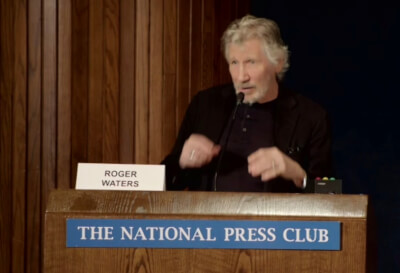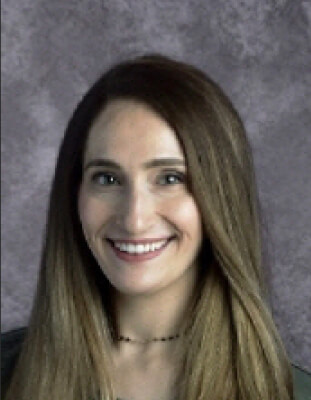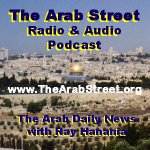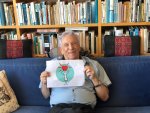Q&A with Dr. Veysel Ayhan, President of International Middle East Peace Research (IMPR), a think-tank center based in Ankara, Turkey
By Abdennour Toumi, Ankara-Turkey
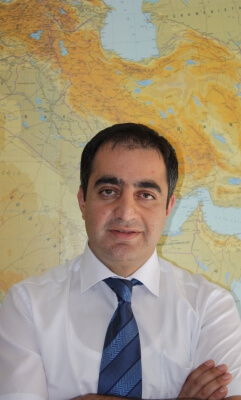
Profile: Dr. Veysel Ayhan is Associate Professor and President of International Middle East Peace Research Center. He is also Associate Professor at the Abant Izzet Baysal University, Bolu, Turkey.
In May 2012, Dr. Ayahan published: Arab Spring Uprising, Revolutions and Change. In 2009, Way to the Empire: Middle East and Oil. In 2008, Lebanon: War, Peace, Resistance and Relations with Turkey.
In light of current events that are taking place along Turkey’s southern borders, Dr. Ayhan genuinely answered our questions on these issues.
ADN: Dr Ayhan, how are things going in Turkey?
Dr. Ayhan: Turkey is in a stage of change. There is a concern, though it is not clear, whether Turkey is moving forward or backward. In terms of stability, the question of democratization, the peace process with the Kurds and the authoritarian mind are uppermost. Right now, there is a debate in the academic milieu and political circles regarding the human and minority rights in Turkey.
ADN: How do you balance your role as an academician, political analyst and humanitarian activist?
Dr. Ayhan: In my opinion, intellectually, we as academicians have a responsibility toward the community. We have to be sensitive to the community’s needs and demands, that we are together, and we are a part of the community. If the community suffers, we have to be its voice and protect the community rights against any abusive state policies. We have to produce a paradigm in order to be a part of this activism, so in that I am a human rights activist. If the academician sits in his office and focusses only on his lectures, it is clear that he is siding with and becoming a part of the political establishment and not providing any help to the community.
ADN: You are one of the experts on the Kurdish question in Turkey; what is your assessment on the latest development in Kobani/Aïn el-Arab, Syria?
Dr.Ayhan: The forces of darkness have been destroyed by the Kurdish resistance in Kobani. Ask a Kurdish person and he will tell you what his father and grand-father did before him or her. When the Syrian civil war broke out, the Kurds said: “It’s a fratricide war” and asked for democratic values in Syria to establish a democratic model in the Middle East. Regional forces pushed the Kurds to participate fighting against Syrian people side of radical elements. But the Kurdish has never accept this forces as Syrian people. Later Kurd established democratic model and invite other nation live together side side in the peace. As the canton system in the three Kurdish Syrian regions (Rojava).
Because they did not want to be part of the Syrian civil war, they were against el-Assad regime and Islamic fundamentalist groups alike…They called upon the Syrian people to live under one democratic system in the region and did not attack any other protagonists in the conflict.
However, they formed the base of defense forces in the Kurdish region. As a result, Christians, Assyrians, and Sunni Arabs left their tribes and clans and moved to the Kurdish area because the Kurds provided them safety. For example, the population of Kobani in a normal time (before the conflict) was 80,000. Later on, the number rose to 250,000 including those who had fled from the northern neighboring provinces. And the other ethnic and sectarian groups trust the Kurds because they know the Kurds won’t attack them.
Right now, the on-going battle between ISO and YPG and the Peshmerga forces is about Kurdish honor and pride. ISO’s ideology is senseless and strange to the Kurds and the local Sunni Arabs. ISO members are coming from Afghanistan, Yemen, French and German suburbs — arriving in Syria some of them think they are in Palestine! and not to kill Kurds…
In Kobani, though, the fighters are not only Kurds; there re Sunni Arabs, Christians and Alawites… the aim is to protect the democratic values the Kurds are aspiring for freedom… and Kobani is the heartland of Kurdistan. Today all Kurds become one nation through Kobani. It has brought all the Kurds in the world back. Maybe we don’t have a soccer team to unite the Kurdish people and wrap them in the Kurdish flag, but the Kobani story line is allowing the world to witness the courage of the Kurdish people across the Middle East.
ADN: Let’s move to the embracing question, what is the Turkish government’s position vis-à-vis IS Organization?
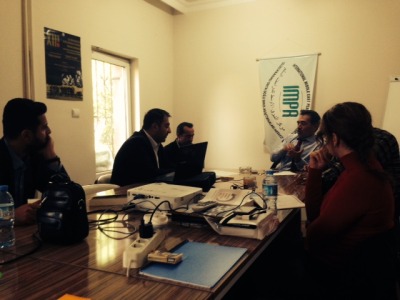
So this issue must be discussed at the highest level among the party’s leadership. If this perception continues, it might open the door of suspicion for the Turks and Kurds that the AKParti is leaning toward Salafism…the problem lies with some of the AKParti leaders; theoretically the AKParti espouses el-Ekhwan (Brotherhood) ideology and discourse. Politically, they might think that the government can use ISO as a pressure card against the Kurds and even against its Western allies.
ADN: Is it because the dynamic of the conflict in Syria changed? and Ankara feels it is losing its role and control?
Dr. Ayhan: Premier Minister Dr.Ahmet Davutoglu, fromer Foreign Affairs Minister, in his visit to Damascus on 08/09/11, declared to the press at Ankara airport, “…the end of el-Assad regime is coming soon and his days are numbered,” he continued, “he might fall in weeks…” By August, 2011, contrary to Dr. Davutoglu’s prediction, more than 100,000 Syrians had died, millions were displaced locally and the number of refugees were mounting in neighboring countries. The Syrian civilization is destroyed — of course el-Assad bears the responsibility for this act — but the funders and the trainers of the Islamic armed groups are also responsible for the chaos and the political impasse today.
Today the dynamic is of course changed, but what did Ankara offer as a model to the Syrian people? From the beginning until today, academicians offer a model to the Syrian people which is to respect all the identities and protect them from either the tyranny of regimes or the moral order of Islamic army groups.
The model, here at IMPR center, we led depth studies on the Syrian crisis to protect the rights of the Sunni Arabs, Durzis, Alawites, Christians, Kurds, Turkmani, and Caucasians, so they can live side by side in peace and harmony in a decentralized system. I think this system is one of best model that we could establish in Syria.
But Ankara is preaching for the fall of el-Assad and putting yet another authoritarian regime in power. This model would not bring peace to the Syrian people or the region. One has to focus on the regime change and not on the leader, hence the international community should look genuinely at this paradigm.
ADN: Is IS Organization is an interchangeable wild card in the hands of the main actors in this conflict?
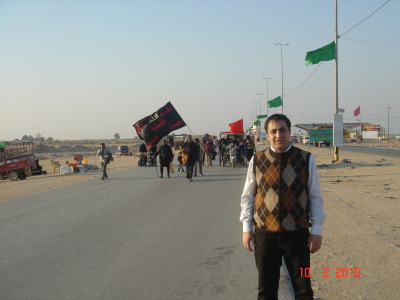
Dr. Ayhan: I think ISO is a wild card used by many actors who want to divide the Syrian and Iraq’s community into an ethnic and sectarian system. In our Ouma (Nation), the Christians and Jews are a part of the Islamic Ouma, but ISO is destroying the notion of the Ouma, dividing it into groups, minorities and small communities… alas the Sunni and Shea’a scholars together did not respond to the 21st century Islamic Ouma paradigm to bring fanaticism to an end for good and liberate our religion from such radicals.
The role of ISO has become clearly a political entity hired or used as proxies in Iraq and Syria. They are working with former Ba’athists (in Iraq) and el-Qae’eda, therefore ISO is “in the cake pan” of Ba’athists in Iraq and el-Qae’eda in Syria.
They (ISO) are nationalists in the Ba’athists’ perception, and sectarians like el-Qae’eda. They are using these two elements as a motif for their barbaric acts against the Kurds in Kobani and Yezidis, Christian community in Iraq. They are mobilizing young, marginalized people, Sunni Arabs and foreign fighters coming from Western countries, who are very indoctrinated and brain-washed.
ADN: Usually diplomacy is not a noun that rhymes with terrorist organization — did Ankara make a deal with IS Organization about its hostages in Mosul, Iraq?
Dr. Ayhan: Without a bargain, ISO would not release the hostages. As a humanitarian activist, I am very happy to see these hostages reunited with their loved ones; on the other hand, nobody (only the intelligence service) knows what Ankara did offer to ISO. I am sure, one day, we will learn about this deal.
Now we can only discuss and eventually speculate because we don’t have any evidence. The Kurds’ perception holds that Ankara offered Kobani to ISO because Kobani is one of the Kurdish cantons in the Syrian Kurdish region and would destabilize the canton model in norther Syria.
ADN: Ankara relaunched the negotiation process with the PKK; don’t you think its vague position toward IS Organization would appear weak? What is the prospect of the peace process? Is there any progress before we speak about the process?
Dr. Ayhan: Kurds lost their trust in Ankara and the AKParti in past decades. Kurds are still not allowed to use their language in public schools, and AK Parti are still calling the Kurds, included Syrian Kurds as terrorists. Kurds are upset at the Turkish government on the Kobani issue and are asking how Ankara can qualify the PYD and YPG as terrorists, while supporting ISO — Kurds in Turkey are feeling Ankara does not protect their brothers in Kobani, but on the contrary, is complicit in their massacre.
Kobani is the symbol for all the Kurds in the region. When the Kurds rose up against the massacre in Kobani, the Turkish police used tear-gas and pepper spray…if they don’t recognize Kobani as a self-government, how could they accept the rights of the Turkish-Kurds?
ADN: How much influence has Mr. Öcalan had on the Kurdish militants and community in Turkey? Does he coordinate with HDP (legal Kurdish party in Turkey)? In other words, can he become the “Jerry Adams” of Turkey?
Dr. Ayhan: Öcalan is as Mused Barzani leader of all the Kurdish nation, he is against the pure nationalism model. His model includes all the ethnic, sectarian groups and religious minorities. He believes people of Anatolia and Mesopotamia can live together peacefully. So he becomes an icon of democracy in the Middle East because of his vision and respect for all identities.
ADN: The PKK has been trying to benefit from the vacuum that the IS Organization advance has created in the region which could demystify the PKK, don’t you think?
Dr. Ayhan: The PKK is not gaining any benefit from the action of ISO, but is seen as a protector of the minorities (look at what they did in Iraq when they protected the Yezidis and helped them to cross into Turkey…) they are a secular movement, and Öcalan wants to change the Middle East through reforms, starting with women’s rights and promotion in the region. For this reason, ISO is attacking and clashing with the PKK because of its views across the Middle East.
ADN: Is the scenario of a military coup plausible? Or do you believe in an intra-AKParti coup?
Dr. Ayhan: First of all, here in Turkey we believe in a healthy democratic process, Turks, Kurds, Alawites and all other people are against any military coup. Politically, we are having some political issues, but this won’t give the military an opportunity to come back and take power. Secondly, these matters will be solved at the polls and people of Turkey respect result of all polls.
Finally, there is a chance that the AKParti leaders could look at another avenue to deal with the crisis that is challenging Turkey and its stability in the south.
ADN: Don’t you think the apocalyptic vision of el-Assad is haunting Turkey?
Dr. Ayhan: We have to know where and who Syria is these days. Syria is in a multi-dimensional crisis at all levels; heterogeneous, all ethnic and sectarian groups inside Syria are fighting. When one tries to touch on this issue, it becomes sensitive, look at the example of Kobani… millions Kurds rose up when they were attacked by another ethnic group. Sunni Arabs, The Alawites, Christians and Assyrians would have the same reaction. Syria is the Middle East. It is not because of el-Assad regime.
Ethnically and sectarian-wise, all have a direct effect in Turkey. Kurds, Alawites and Sunni Arabs, the Islamist ideology, all these elements effect Turkey. So the prospect is to relinquish nationalism, ethnic, sectarian, and ideological aims and look at the matter from the humanitarian perspective.
We could find an answer to the Syrian crisis without the interference of countries that might think they have a direct task…all of them have the same problems in their own societies. If you don’t solve the Kurdish question in the region, how could we bring stability to Syria. If you don’t look at the question of the Alawites in Turkey, how could we solve the Syria crisis, if we don’t solve the Sunni Arab question in Iraq, how could we solve the Syrian crisis…
The solution of the decentralization system is getting closer to solving the region’s administrative, economic and institutional problems. Under this model people in the region will feel safe, and their region will become stable and prosperous.
ADN: Is the Kurdistan State only a question of time to be born?
Dr. Ayhan: Kurds are a part of the transformational process that is taking place in the Middle East today. It is a legitimate wish and demand to have their own state. However, in reality, Kurds want more than a state; their desire is to transform the Middle East from tyranny to democracy. So it will be a Kurdistan region, it will be a Durzis region, Arab region, but if we establish a democratic system in the Middle East, the Kurds won’t need an independent state.
The Nationalist-State model is a failure model. Look at the E.U., they are removing borders and increasing freedom of circulation of goods and people which seems to be working for the Europeans; therefore, the Kurds will be a constructive asset in the new Middle East.
Thank you indeed, Sir.
Related articles


- The Israeli-Palestinian Conflict: Is the Neither-Peace-nor-Security As-sumption Dominating Again? - June 7, 2021
- Algeria: “I Can See Clearly Now” - August 5, 2019
- Majesty Mohammed VI and General Gaïd Salah Tear Down This Wall! - July 29, 2019















